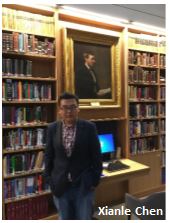
July 4, 2016, by Editor
The importance of history in championing the future prosperity of British Pharmacy
This blog has been written by Xianle Chen, a third year MPharm student, about his exciting summer placement on a project with the National Pharmacy Association having been awarded the Rajesh Joshi Memorial Bursary offered by The British Society for the History of Pharmacy and The Health Education Foundation.
It may not be initially obvious to understand the role of history in the development of pharmacy. However Cicero, the Roman philosopher once said “Not to know what happened before you were born is to remain forever a child”. The history of pharmacy, given its ancient origins in Britain, should form the intellectual foundation to promote world-leading research in formulating new therapeutic agents.
For example, take the discovery by researchers at the University of an Anglo-Saxon medical recipe as a potential treatment for MRSA. This suggests that the preservation of pharmaceutical artefacts may provide academic professionals with practical ideas to guide the propagation of British pharmacy.
Adopting the significance of the “medical recipe” case, my research project is to explore the history of the National Pharmacy Association (NPA) and its subsequent implications. An appreciation of the NPA’s history from its initial establishment in 1921 up to the situation today requires the search for correlation between the various macro-historical processes and signs of repetition.
With the above insight outlined, the scope of this research covers the dynamic background of British history from social, political and legal aspects, which will eventually lead to the examination of the NPA’s policies and administration presented throughout the 20th century. An example can be made of the introduction of the Dangerous Drug Act which first challenged the pharmacy profession for the control of drugs via regulation. This inevitably affected the early formation of the NPA and will be discussed in one section of this research.
Part of the project will be to produce a short biography for each chairman of the NPA, and the primary resources are the obituaries published by the Pharmaceutical Journal and the Chemist & Druggist. Hence a visit to the Royal Pharmaceutical Society (RPS)’s library is a must for me to gain access to the relevant information required. Both the ancient Greek sculptures located at the reception and the elegant design of the internal decoration indicate the historical weight of the pharmacy profession. Walking inside the library was like experiencing the achievement of the milestones and the struggles that the profession has had to endure in order to reach its position today.
In conclusion, my thoughts about this research are that history is the cultural reflection of humanity and its application is proven to be vital even in the field of pharmacy. In the way that many classic products of literature were an overview inspired by ancient legends, an overview looking into the past can also serve as the enlightenment for the revolutionary transformation of British pharmacy. I hope that this project can provide this profession with humanistic qualities.
No comments yet, fill out a comment to be the first


Leave a Reply